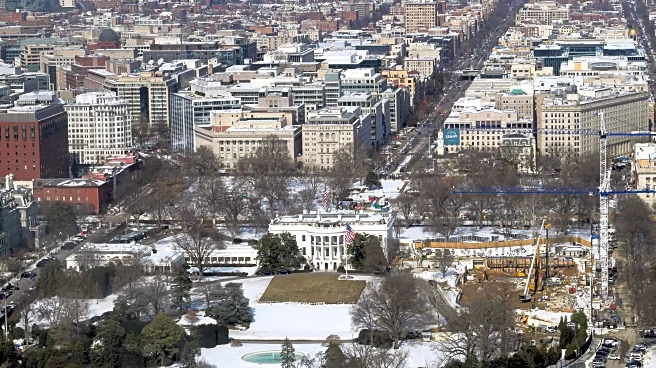What's Happening?
The ongoing federal government shutdown has prompted calls for bipartisan cooperation to end the impasse and restore services. The shutdown, resulting from partisan disagreements in Congress and the Executive
Branch, is affecting various federal agencies and services. The article highlights the impact on citizens who rely on federal assistance during crises, emphasizing the need for a functioning government to provide a safety net. The author, a former federal civil servant, argues that the shutdown harms recruitment and retention of talent in the civil service, particularly in technical fields. The piece calls for a collaborative approach to reduce government inefficiency while maintaining essential services.
Why It's Important?
The federal government shutdown has significant implications for U.S. citizens, particularly those dependent on federal services during emergencies. It disrupts the operations of agencies like FEMA, EPA, and NOAA, which play crucial roles in disaster response and environmental protection. The shutdown also affects the morale and effectiveness of civil servants, potentially leading to long-term challenges in attracting skilled professionals to government roles. The situation highlights the need for political leaders to prioritize the functioning of government over partisan interests, ensuring that essential services are available to the public.
What's Next?
The resolution of the government shutdown will require bipartisan negotiations and compromises to address the underlying budgetary and policy disagreements. Political leaders may need to engage in discussions to find common ground and develop a sustainable funding plan for federal operations. The shutdown could lead to public pressure on lawmakers to prioritize government functionality and accountability. Future legislative efforts might focus on preventing similar shutdowns by implementing measures that ensure continuous funding for critical services.
Beyond the Headlines
The shutdown raises broader questions about the efficiency and size of the federal government. Discussions may emerge on how to streamline operations and reduce waste while maintaining essential services. The role of civil servants in implementing laws and regulations impartially is crucial, and the shutdown highlights the need for a robust civil service system that can adapt to changing political landscapes. The situation also underscores the importance of public understanding of government processes and the impact of political decisions on everyday life.











